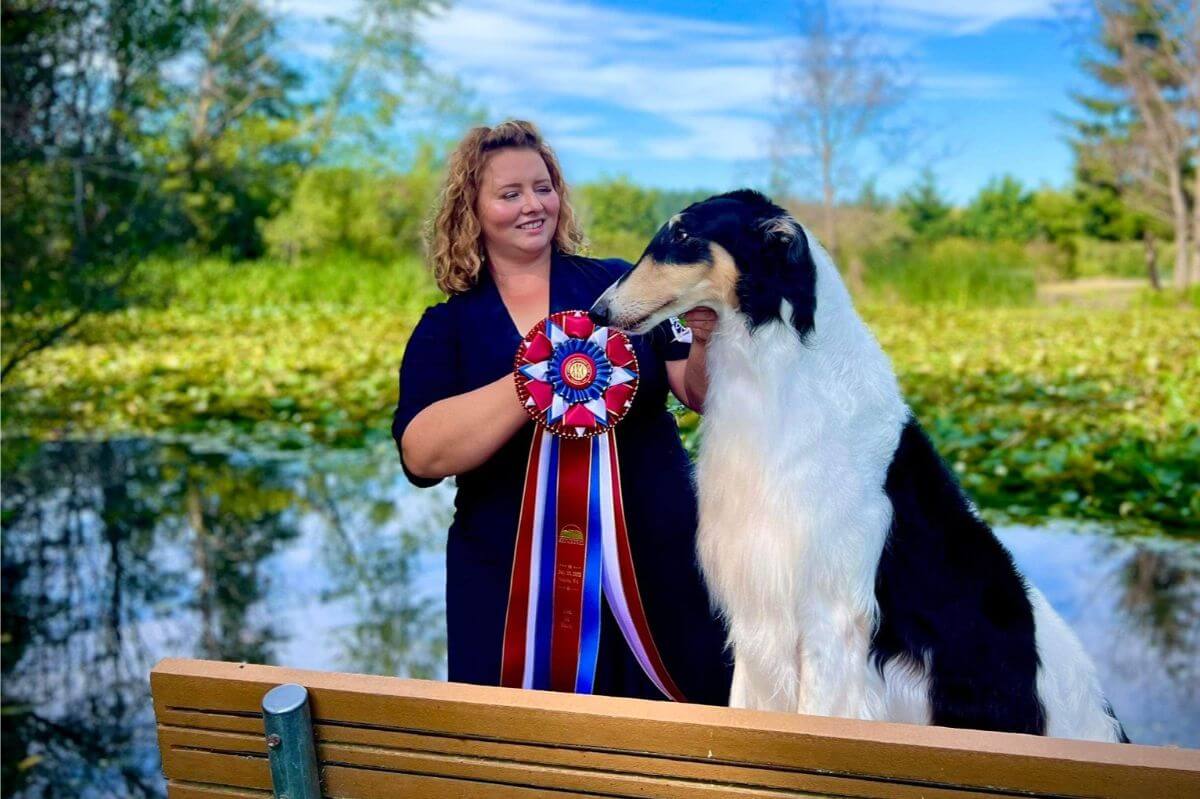
Home » Thoughts From the Professional Handler – Robin Stachon

Robin Stachon: My name is Robin Stachon, and I live in Olivehurst, California. It’s a little country town in Northern California. I have been handling on my own for about five years now. I was born into the dog show world, as my Mom breeds and shows Borzois. I started showing in Junior Showmanship when I was about 9.5 years old with my six-month-old Borzoi puppy, “Guzzi.” Since we hit the ring for the first time, I was hooked and wanted to learn more. Some of the handlers I have worked for and apprenticed for were: Bruce and Tara Schultz; Larry, Laurie, and Elizabeth Fenner; Jean Gauchat and Josh Hargis; Clint and Karen Livingston; and Janice Hayes, to name a few. I still learn at every show and am fortunate to continue to be mentored by senior handlers.
Robin Stachon: Judging has changed, but we will get to that in a later question. Having more shows and clusters are great to have, but overall, the shows are getting smaller each time. I remember when local shows used to have 1,500 a day; nowadays, we are lucky to have 1,000 dogs at a show. A few weeks ago, I saw a show with 350 dogs entered. The decline is sad and we need to encourage new exhibitors to keep the sport alive. I believe that social media is helpful in educating people from outside the dog world. It allows us to share our passion for the purebred dog, show them what we do at shows and why we love it, and it encourages them to learn about purebred dogs, and the health and well-being of the individual breeds.
Robin Stachon: I believe that AKC thinks out each change to the rules, to evolve with changing times and the challenges those changes make for dog shows and performance events. I personally like having a Reserve Best in Show. It’s another form of recognition and achievement or goal for a dog and owner—as well as excitement.
I feel the rule of earning championship points and majors through Group placements is a great idea. This encourages rarer breeds or smaller entry breeds to enter, by giving more opportunity for finishing and more recognition to the breed through Group placements.
Any win at a specialty or national specialty is a great accomplishment. Reserve at a national specialty should earn championship points, in my opinion. Having drawn the best of each breeder’s kennel, and being considered the second-best dog or bitch in a power-packed Winners line-up, should get some recognition towards their championship.
Robin Stachon: Subjective judging has been showing more often than it should. Just because you are friends doesn’t mean you need to put them up. Just because a dog or bitch can finish doesn’t mean it should be a Special or campaigned. We should be pushing each other to improve our breed and promote the best for that breed. It is crucial for us to emphasize the significance of judging based on the Breed Standard rather than succumbing to popularity. In dog shows, the true essence lies in recognizing and rewarding the quality and adherence of each dog to its respective Standard.
It is imperative that judges uphold the integrity of the competition by focusing on the unique characteristics, temperament, and structure described in the Standard. Having judges do written critiques, whether it’s a few dogs or the whole entry, I think, would help to understand what judges are looking at, and if needed, they could receive additional mentoring to understand the breed.
Encouraging positivity in the dog show world for newcomers, creating mentorship programs, providing educational resources, and fostering a supportive community are important. Promoting inclusive and welcoming environments, where experienced participants share knowledge and celebrate each other’s successes, can inspire newcomers to feel more comfortable and engaged in the dog show community. If we actively support and mentor novices, we not only broaden the diversity of participants, we also ensure the continued growth and vitality of our dog shows and purebred dog community. NOHS is a great way of encouraging newer people into the sport.
Robin Stachon: Be kind to one another. There’s no reason we need to tear each other down. We are all here for the love of dogs, regardless of breed. Embrace the journey, cherish the moments, and let the beauty of today inspire your tomorrow. Choose peace over drama, and you’ll find infinite strength in simplicity.